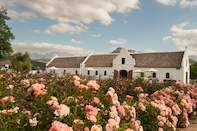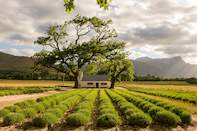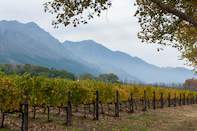Although intensely private people, acclaimed South African mezzo-soprano Hanneli Rupert-Koegelenberg and husband Hein Koegelenberg cannot resist sharing their love of wine, music, art and flowers with visitors to their gracious 18th-century homestead at La Motte.
Picture Perfect

Not long ago, as you approached the white gateposts of La Motte, you would slow down to take in the picture-perfect scene on the right: a tiny whitewashed cottage beneath a magnificent oak in a field of purple lavender.
A date on a corner-post of the cottage suggested it was built in 1712. If an old powder-blue Volkswagen Beetle was standing there, Pietie le Roux would be busy in the quaintest ‘office’ in the Cape.
During nearly four decades as La Motte’s viticulturist, Le Roux has gradually replanted what used to be a white-wine farm to mainly noble red varieties for La Motte’s acclaimed Shiraz, Cabernet Sauvignon and Millennium blend.
Then in the early 2000s, on 20 hectares of marginal vineyard land, he’s embarked on a then relatively unknown venture in South Africa: the cultivation of lavender, thyme and indigenous rose pelargonium and buchu for essential oils for potential use in South Africa’s fledgling perfume industry.
While Pietie has since left La Motte to consult more widely in the valley, the product of his labour formed the basis of the Arômes de la Motte range of organically produced body products (among the cornucopia of fresh produce and stylish artisanal homeware stocked in the La Motte Farm Shop reminiscent of an old Cape general dealer’s store).
Champion of Arts and Culture

From the formal entrance to the estate proper, the drive leads past the farm’s newer vineyards on the slopes of Klein Drakenstein and then past the historic core of the 18th-century Cape Dutch homestead.
The white-washed, gabled and thatch-roofed manor house is but one of many meticulously restored historical features on the farm. Next door is the original cellar, dating to 1782, where the walls are lined with vats bearing the names of French Huguenot wine families who established viticulture in the Franschhoek Valley.
Today the farm is run by Hanneli Rupert-Koegelenberg, one of South Africa’s leading mezzo-sopranos, and her businessman husband, Hein Koegelenberg. Hanneli has added music to the mix of farming enterprises, inviting leading South African and international classical musicians and singers to perform in evening concerts here throughout the year.
At times she herself has taken the stage and guests have also been treated to pre-concert snacks and La Motte wines in the cellar or on the lawns adjoining the rose garden.
Like her father, the late Dr. Anton Rupert, she’s an avid cultural and environmental conservationist. Rupert, an international businessman, bought La Motte in 1970 to restore the architectural and viticultural integrity that French Huguenot Pierre Joubert had established on land first granted to a German settler in 1695.
Similarly, to retain local ownership of what she regarded as national treasures, his daughter bought the 30-year collection of indigenous disas from renowned horticulturist (and leading SA paediatric surgeon), the late Professor Sid Cywes, and has built up an important portfolio of works by 20th-century SA artist Jacob Pierneef, on view in the La Motte Museum which also hosts exhibitions of leading local artists.
Elegance in All Things

Take a Pierneef home with you by investing in the flagship wines graced by one of his distinctive black and white lino-cut prints on the labels.
Besides long-time cellarmaster Edmund Terblanche’s elegant reds and an award-winning barrel-fermented Chardonnay, try the organically grown Sauvignon Blanc and the opulent Shiraz-Viognier under the Pierneef label.
Grapes also come from Nabot, a Rupert farm in the Walker Bay region that is dedicated to organic production methods and forms part of the Green Mountain Eco Route, a world-first biodiversity wine route in the Elgin area.
La Motte has gradually been introducing organic farming methods to its 75 hectares of home vineyards, too, which has helped to earn the farm championship status in the South African wine industry’s BWI (Biodiversity & Wine Initiative). There is a hiking trail through the mountain fynbos behind the farm which is being rehabilitated.
A stylish overhaul of the farm’s cellardoor experience in 2010 included a luxurious tasting lounge adjoining the imposing glass-walled production and barrel maturation cellar linked by a wooden walkway across a water feature through landscaped gardens to a tree-shaded courtyard flanked by the fine-dining Pierneef Restaurant and country chic La Motte Farm Shop.
‘La Motte Rediscovered’, announced mid-2022, promises ‘exciting changes’ for visitors. The farm remains open for wine tastings and sales (temporarily moved to the historic red wine cellar) and the hiking trail will be given a winter hiatus.
The Pierneef Restaurant, La Motte Museum and La Motte Farm Shop are being refreshed for re-opening in 2023, while the weekly Historic Walk and Sculpture Walk and the monthly Classical Music Concerts are being suspended until further notice.
 This mountain-ringed valley’s celebrated French character comes from the Huguenots, refugee French Protestants who settled here during the...
This mountain-ringed valley’s celebrated French character comes from the Huguenots, refugee French Protestants who settled here during the...